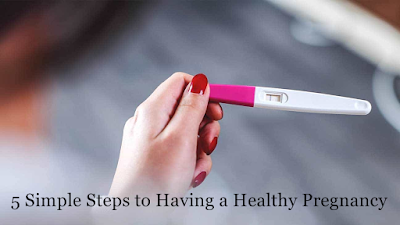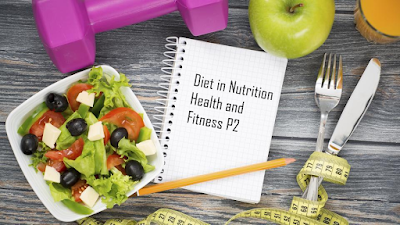Busy Mum's Guide to Losing Weight - Hormonal changes during pregnancy, and quite normal fat gain often makes many women feel unattractive and sometimes quite depressed. Many women still believe that "eating for two" is the way to go during pregnancy. I am sorry if I disappoint some of you, but this really is not the case. If a woman eats to satisfy her appetite, her weight will usually increase by about 3.5kg (8lb) in the first 20 weeks of pregnancy and then by about 0.5kg (1lb) a week until the end of the pregnancy.

The total weight gain during pregnancy will be about 12.5kg (27lb). Gaining too much weight during pregnancy can raise blood pressure and increases the risk of becoming obese (very overweight) in the future. Although women should not restrict their food intake or go on slimming diets when pregnant, there is no need to increase food intakes significantly until late pregnancy. Incidentally, those who do gain weight over and above what is normal are the ones who struggle most with post-pregnancy weight loss, and fatigue.
LATE PREGNANCY
The estimated averaged requirement for energy (EAR) increases during the last three months of pregnancy by an average of 800kJ (200kcal) per day... equivalent to 2 oatcakes with ricotta cheese and fruit spread and 2 dried figs - a snack like this would provide extra iron and calcium too - 2 vital nutrients to increase during these latter stages!
At this time a woman's energy expenditure from physical activity is usually reduced.
So what can you do to lose any unwanted pounds gained during pregnancy?
For new mums!
The most natural, safest and easiest way to lose weight after giving birth is to breastfeed! Breastfeeding can burn up to 500 calories a day (the equivalent of a good workout) so helps drop excess pounds and enables many women to get back to their pre-pregnancy weight without too much effort.
Breastfeeding not only gives your baby the best possible start in life, but it also gives you added incentive to eat healthily and sensibly. Breast milk is not only the perfect food for your baby; it is also your baby's main protection against disease and infection. Baby's first milk or "colostrum" provides vital IgA antibodies (the first-line defence antibodies) received in the first 24-48 hours of life! These are not found in formula milks.
Naturally the health of the mother is paramount in passing on healthy immunity to the child. Many protective antibodies are "anti-allergenic" protecting the baby against developing food allergies, asthma, eczema and other allergic conditions. Breast milk has the perfect fat and protein profile for the baby, and nutrients such as iron and manganese are much more absorbable in breast milk than they are in formula milks. Furthermore, only breast milk contains chromium (essential for controlling blood sugar levels), selenium (an important antioxidant), and normal levels of essential fatty acids (EFAs), which are vital for the baby's brain development. Lastly, breast-feeding helps to establish a protective bacterial population in the infant's digestive tract - yes, those "friendly bacteria" we hear so much about!
During the early weeks of motherhood... breastfeeding, regular daily walks, and "intelligent" eating is the way to go.
N.B. DO NOT DIET WHILE BREAST FEEDING
Fat cells contain toxins and nasty "residues" of foods eaten in previous years! Losing weight too quickly releases these stored toxins into the bloodstream. Often the liver cannot clear them quickly enough, and for breast-feeding Mums, these can easily be transported into breast milk. Remember you'll gradually lose weight quite naturally if you can breast feed. Dieting only reduces the nutrient quality of your breast milk, reduces the level of sugar in the blood and the level of certain brain chemicals. This leads to binge eating and mood changes - so DO NOT diet, especially while breastfeeding!
You must look after yourself...
In order to give your baby the best start in life, the first consideration has to be the food you eat. It is important to have an adequate intake of nutrients, particularly the B vitamins, zinc and EFAs. Foods such as oily fish, pumpkin and sunflower seeds, avocados, almonds etc. contain all these types of nutrients making them excellent snack foods or additions to salads, soups and stir-fries. The quest to cut down on calories by avoiding all fatty foods generally results in a deficiency of EFAs, which are vital to the body's metabolism.
Suggested meals and eating times for pregnant or breast-feeding Mums:
7-8am - Breakfast (Oat porridge with soya milk, chopped banana + pumpkin seeds or ground linseeds)
10-11am - Snack (a pear and 6-8 almonds)
1-2pm - Light Lunch (Small baked sweet potato with tuna, tomato, avocado and salad)
4-5pm - Snack (fresh fruit, rice cakes and fruit spread)
7-8pm - Evening meal (poached fish or grilled chicken, salad, steamed veg & brown rice)
Other snacks (nut and seed mix, fresh fruit, raw crudités and ricotta dip)
N.B. Try almond or rice milk occasionally on homemade cereal. Use Tahini (sesame seed spread) or almond butter on breads & crackers, pure fruit spreads instead of jams, and use cold flax seed oil (rich in omega-3 fats) daily. Other beneficial oils include olive oil for cooking, and using cold walnut oil and pumpkin seed oil on salads, rice and vegetables.
In terms of portion sizes, work more to your natural appetite, and begin to better recognise TRUE hunger signals. If you think of hunger on a scale of 1-10, only eat when feeling about 2/3, and STOP when you feel satisfied, around 7-8. This "appetite scale" is a key tool and one I often use when helping people with weight problems and "emotional" eating - i.e. eating to fill an emotional void, rather than purely for fuelling reasons!
Dietary advise for all Mums
Watch your sugars!
Sugar is a major culprit in weight gain and obesity. Being hooked on sugar and sugary foods is easily passed on to children and a recipe for developing blood sugar and energy imbalances, behavioural and weight problems. Biscuits, cakes, chocolate bars, processed foods and low-fat foods contain the most "hidden" sugars. Read food labels carefully, and try and get you and your children used to more natural foods and natural sugars. Natural sweetness is present in many fresh foods. Try doing taste tests with the children, identifying different flavours and degrees of "sweetness" in fruit and vegetables, dried figs, apricots and raisins.
Use honey used in cooking or drizzled on plain yogurt! Eat up to 4 pieces of fruit a day and encourage your children to do the same. Fruit such as bananas, apples, pears and berries in the summer are great snack foods to have between meals. Get out of the habit of giving sweets or sweet food as treats. This only becomes a learned habit and one, which you were probably taught as a child! Sweet things soon become something we turn to when feeling low or depressed, or something we often reward ourselves with. Try also not to use high fat and sugary snacks to fight boredom. Engage the children in a game, or take a trip to the park.
Healthy snack foods
It is OK to snack, providing a) that you are hungry and b) the foods that you snack on are nutritious. There are some good examples below! Protein foods eaten as snacks tend to fire up the metabolism more effectively than carbohydrate dense foods such as bread, biscuits, scones, flapjacks and cake. These are not the best foods for maintaining energy levels or burning fat due to the disruptive effect they have on blood sugar levels, and the ease at which excess is eventually stored in fat cells as FAT! Slow-releasing carbohydrates (fresh vegetables and wholegrains, and low-sugar fruits) and protein foods better balance blood sugar, promote energy and help to burn fat.
Here are some perfect examples of small snacks and meals to give you energy and kick-start the metabolism:
An apple or pear and a palmful of almonds
Other fresh fruit with a handful of pumpkin or sunflower seeds
2 oatcakes with mashed avocado, or Tahini spread
A tuna or poached salmon salad
Aduki bean and chickpea salad with lettuce and tomatoes
Vegetable crudités and hummus
A bowl of chunky homemade vegetable soup
Stir-fry tofu or chicken and vegetables
Feeding children healthy snack foods is critical to develop good eating habits. It also means that if you are tempted to finish off leftovers, at least they will be healthy leftovers!
Great snack foods for the children (and Mum!):
Mini rice cakes thinly spread with almond butter or pure fruit spread.
A few strawberries, pieces of pear or some grapes.
Carrot sticks and cherry tomatoes.
Popcorn - instead of crisps - use olive oil over high heat. Sprinkle some whole corn kernels into a pan. Cover and wait for the popping to finish. Empty pan immediately to avoid burning.
Yogurt lollies - Mix fruit juice concentrate with natural yogurt to desired taste and freeze in lolly moulds.
With children, it is better to give a couple of alternatives for snacks or foods at meal times, rather than saying "What would you like? Offer them an apple or a banana when they come in from school or nursery. Children need your authority (not your lack of willpower!). Lay the lunch or dinner table with 2 or 3 choices of things they can eat, and use lots of colours and shapes.
Children's health and vitality largely comes from the food they eat. By teaching your children to eat healthy, nutritious foods, you will also be teaching or re-training yourself to understand how diet can make all the difference when it comes to looking and feeling your best!
Dietary advice for Mums
Eat regularly, 4-5 times a day.
Eat 4-5 pieces of fruit a day.
Keep sugars and refined carbohydrates to an absolute minimum.
Avoid carbohydrate-dense foods such as bread, scones, biscuits etc. during the day.
Snack on fresh fruit, pumpkin seeds, sunflower seeds, almonds, walnuts, ½ an avocado etc. All these foods keep blood sugar levels stable, reduce sweet cravings, and nuts and seeds contain EFA's. Remember, EFA's are essential for normal metabolic functioning and remove stored fat from fat cells.
Try and eat fish as a main meal at least 3 times a week.
Drink at least 2 litres (3 ½ pints) of filtered tap water a day.
Don't eat late, especially not a high fat, high calorie meal.
Eat a large bowl of fresh salad everyday.
Cut right back on tea and coffee and avoid all together if breast-feeding.
Suggested meals and eating times if you want to lose weight:
7-8am - Breakfast (Chopped apple & pear, live plain yogurt + 1 dessert spoon of seeds)
10-11am - Snack (2 oatcakes with Tahini spread)
1-2pm - Light Lunch (large salad with tuna, tomato and avocado)
4-5pm - Snack (1-2 pieces of fruit)
7-8pm - Evening meal (steamed or grilled fish, tofu or chicken, salad, steamed veg & 1 tbsp. wholegrain or basmati rice)
Other snacks (peaches, raw carrot, olives, celery and tomato)
N.B. Try soya or goat's milk on cereal. Use dairy-free spreads such as Vitaquell margarine or Tahini (sesame seed spread) on bread & crackers, pure fruit spreads instead of jams, and try flax seed oil (rich in omega-3 fats), sesame oil, or walnut oil on salads, rice and vegetables.
Some exercise advice when you've found your "me time"!!!
Exercise (coupled with a healthy eating regime) makes all the difference when trying to regain pre-pregnancy, or simply an ideal weight and shape. Exercising regularly can be difficult with babies and young children... BUT, it is not impossible!
Keeping fit and toned creates a happier person, a happier Mum, and happier children. Surely that's incentive enough! Staying active with energetic children is easy, and at the same time it's helping keep the metabolic rate active. However, to really burn excess fat, it's necessary to literally "train" the body to do this. Regular cardiovascular exercise that significantly raises the heart rate has to be a major consideration when wanting to lose weight. The sooner you can start a regular programme of aerobic activity the better.
Brisk or power walking, jogging, steady cycling, mountain biking, aerobics classes, step classes or swimming are great examples of cardiovascular activities that are particularly effective at teaching the body to better burn body fat. Try these exercises for 30 minutes 3-4 times a week if possible. It is important to take time out for yourself, so don't feel guilty about doing this. Husbands, partners, parents, friends etc. can watch the kids while you go for a 30 minute brisk walk, a gym workout, a swim, or continue with your favourite exercise class.
Alternatively, crèches nowadays are very accessible and a 'haven' for many busy Mums. They can be very useful, and a great opportunity for your child to begin interacting with other young children.
Sitting at home is a recipe for eating too much so try and spend as much time being active with your children. Weather permitting, spend time in the garden or park, go walking, and involve yourself and your child in activities such as throwing and catching a ball, swimming or tennis.
Pelvic floor exercises - essential after giving birth!
Try and perform some "pelvic floor" strengthening exercises. These can be done literally anywhere and at any time of the day. The pelvic floor muscles become weakened after pregnancy so need to be worked in order to avoid embarrassing "leaking"!
The easiest way to do this is to imagine you're desperately trying to stop the flow of urine. Squeeze the muscles upwards, HOLD for 30 seconds, and then release. Complete this exercise up to 20 times, twice a day if you feel these muscles have become weak.
It is also important to re-strengthen weak abdominal muscles. Abdominal curls are one of the best exercises to tone and flatten the abdomen, so try and do a couple of sets after your 30 minute aerobic sessions. With any exercise, perform the movements slowly and in a controlled way, working to the point of "muscular fatigue" (i.e. the last few are hurting!).
Tips to remember
* Be active as much as possible
* Take time out for yourself
* Try and routinely do 30 minutes of cardiovascular exercise 3-4 times a week
* Cut out sugar and sugary foods
* Get used to naturally sweetened foods such as figs and grapes, and raw vegetables such as carrots and tomatoes
* Replace desserts with fresh fruit or have a salad starter instead
* Avoid carbohydrate dense foods throughout the day
* Drink part fruit juice and part water to increase fluid intake
* If you're a new Mum, remember breast is best for natural weight loss!










